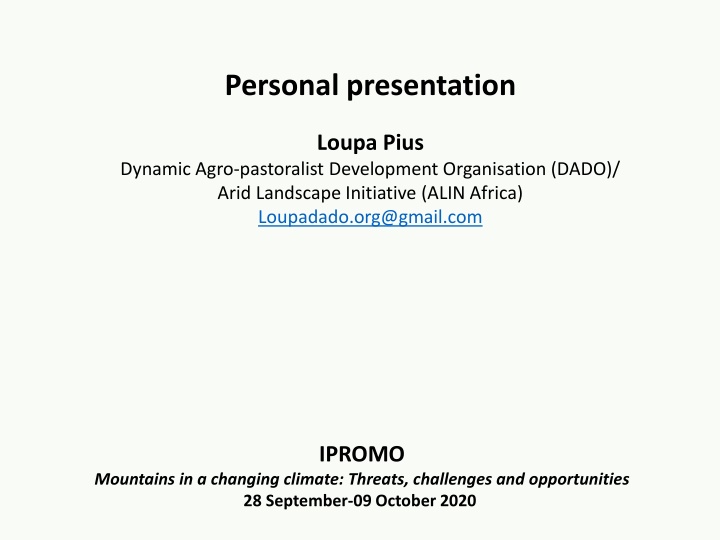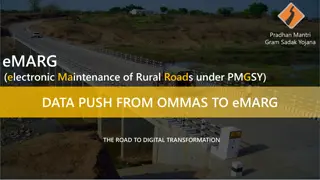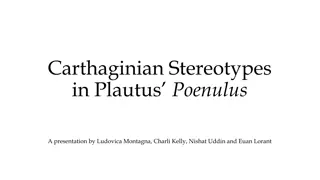
Dynamic Agro-pastoralist Development Organization (DADO) - Transforming Agriculture in Uganda
"Join Loupa Pius and DADO in their initiative to enhance food security, nutrition, and income for smallholder farmers in Uganda's Karamoja region and Katakwi District. Discover how the project aims to empower women and men farmers, improve market accessibility, and promote sustainable agricultural practices. Get involved in community advocacy, social campaigns, and more with Loupa Pius's dedicated efforts."
Download Presentation

Please find below an Image/Link to download the presentation.
The content on the website is provided AS IS for your information and personal use only. It may not be sold, licensed, or shared on other websites without obtaining consent from the author. If you encounter any issues during the download, it is possible that the publisher has removed the file from their server.
You are allowed to download the files provided on this website for personal or commercial use, subject to the condition that they are used lawfully. All files are the property of their respective owners.
The content on the website is provided AS IS for your information and personal use only. It may not be sold, licensed, or shared on other websites without obtaining consent from the author.
E N D
Presentation Transcript
Personal presentation Loupa Pius Dynamic Agro-pastoralist Development Organisation (DADO)/ Arid Landscape Initiative (ALIN Africa) Loupadado.org@gmail.com IPROMO Mountains in a changing climate: Threats, challenges and opportunities 28 September-09 October 2020
Education Uganda Martyrs University Bachelors of Science in Agriculture Nyabyeya Forestry College Diploma in Apiary production/Beekeeping Lubiri High School Advanced Certificate Employment and main activities Project Coordinator DADO Uganda Monitoring project plans Development of capacity building materials Capacity building and mentorship of Junior Farmer field schools in selected primary schools and sub counties Supervision and mentorship of Community Based Facilitators Capacity building of farmers and CBFs on climate smart agriculture, post-harvest handling, Vegetable farming and FMNRR Aid support to the local governments in delievery of farming based services Ensure gender and sustainability systems are adhered in the process of structural development
Other interests (volunteer work, hobbies etc.) Community Advocacy Social media Social campaigns Adventure Politics
Presentation: Project brief description 1/3 Project Location: Karamoja, Teso and Northern Uganda Project stakeholders: Smallholder farmers (Women and men, Youth) Projected Target: The project will benefit 68,250 Households (60% women) smallholder farmer households. Objectives: the overall objective is to increase food security, improve maternal and child nutrition and enhance household income in the Karamoja Sub-region, and Katakwi District. The specific objectives include: Increased production of diversified food by women and men smallholder farmers. Increased market accessibility for women and men smallholder farmers. Improved nutrition and uptake of family planning services through gender-responsive community-based approaches.
Presentation : Expected Results 2/3 Expected Results; Increased adoption and production of diverse food crops and animal products. Increased access to key input and output markets for women and men small-scale farmers. Improved access to credit along the value chain through community saving and credit schemes Sustainable Strong linkages between smallholder farmers, agro-processors and market operators established. Market opportunities and product niches identified along the value chain and market exchanges and contractual agreements increased. Increased adoption of community-based gender transformative nutrition initiatives Increased community appreciation of SRHR (family planning)
Implementation Approaches 3/3 The program will apply Inclusive Market Development approach, as premised in the Economic Empowerment Framework, Fosters equal access to and control over economic resources, assets and opportunities as well as changes in social norms and economic structures that benefit women and men equally. The program will emphasize district ownership and participation, gender equality and women empowerment, Youth engagement and employability, Community-based nutrition, The value chain approach, Engagement with private sector entities, and linkages between smallholder farmers, producer groups, and agro-processors. Implementation will be fused using multi-stakeholder engagement and building of synergies with existing government and development partners initiatives.
Thank for your attention! Alakara Nooi


















